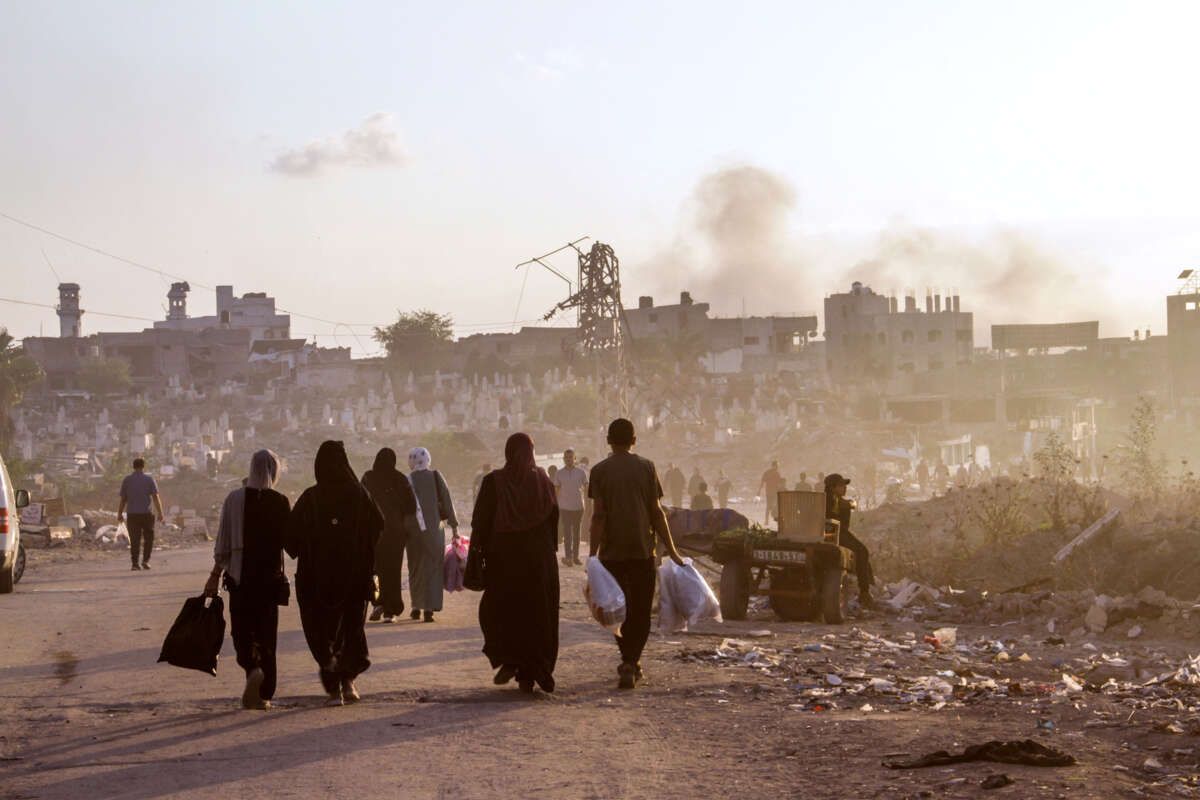A United Nations report published Tuesday estimates that Israel’s relentless bombardment and siege of the Gaza Strip has erased nearly seven decades of human development progress in just over a year, jeopardizing “the future of Palestinians for generations to come.”
The report, produced by the U.N. Development Programme (UNDP) and the U.N. Economic and Social Commission for Western Asia (UNESCWA) estimates that Gaza’s poverty rate will surge to 74.3% this year — with over 2.6 million people newly impoverished — and the enclave’s Human Development Index (HDI) will drop to 1955 levels.
The HDI is a measure that includes life expectancy at birth, education, and standard of living.
Since Israel’s latest war on Gaza began in the wake of the Hamas-led attack on October 7, 2024, the enclave has been transformed into a “graveyard for children” and a “vast wasteland of rubble and twisted steel,” with schools, homes, hospitals, markets, sanitation facilities, and other civilian infrastructure utterly destroyed by Israeli airstrikes — often carried out with U.S. weaponry.
The new U.N. report observes that since last October, dozens of people have died of malnutrition and “there has been a high risk of famine in the Gaza Strip in the context of the ongoing war and the restriction of humanitarian access.”
“Hunger and malnutrition among mothers and babies is hugely harmful to children’s survival, growth, and development,” the report states. “Across Gaza, 93% of children and 96% of pregnant and breastfeeding women are consuming fewer food groups daily, leading to households skipping meals.”
The report also highlights Israel’s destruction of Gaza’s healthcare and education systems.
UNDP estimates that as of last month, 625,000 students in the enclave “have no access to education” and at least 10,317 students and 416 educational staff had been killed in Gaza. Schools that have not been destroyed have been turned into shelters for displaced people — shelters that Israeli forces have targeted repeatedly.
The new analysis warns that even if a permanent cease-fire is achieved in the near future — a scenario that does not appear likely—infectious diseases that have spread due to Israel’s bombing of healthcare, sanitation, and water infrastructure are expected to remain a dire threat to the people of Gaza.
“Cholera, measles, polio, and meningococcal meningitis pose the greatest threats,” the U.N. bodies said Tuesday. “Even if the war ended immediately, the time required to restore functioning health services would still result in thousands of excess deaths. Lack of access to clean drinking water and sanitation facilities creates significant health risks for all, and can exacerbate the situation.”
Achim Steiner, a UNDP administrator, said in a statement that the report’s findings “confirm that amidst the immediate suffering and horrific loss of life, a serious development crisis is also unfolding.”
“The assessment indicates that, even if humanitarian aid is provided each year, the economy may not regain its pre-crisis level for a decade or more,” said Steiner. “As conditions on the ground allow, the Palestinian people need a robust early recovery strategy embedded in the humanitarian assistance phase, laying foundations for a sustainable recovery.”
ESCWA’s executive secretary, Rola Dashti, said that “our assessments serve to sound the alarm over the millions of lives that are being shattered and the decades of development efforts that are being wiped out.”
“It is high time to end the suffering and bloodshed that have engulfed our region,” Dashti added. “We must unite to find a lasting solution where all peoples can live in peace, dignity, and reap the benefit of sustainable development, and where international law and justice are finally upheld.”
Ahead of the U.N. report’s release, Norwegian Refugee Council (NRC) secretary-general Jan Egeland announced that members of his organization’s staff are visiting Gaza City this week to witness “the utter devastation there as a result of Israeli bombardment.”
“The scale of destruction is truly shocking,” said Egeland, adding that NRC staffers “were able to speak with those who had fled North Gaza, most of which is under tight siege.”
“Testimonies they heard from people there,” Egeland continued, “included elderly parents unable to reach the bodies of their dead children for burial, of the sick and desperate with zero access to essential medicine, and of people now destitute having spent entire life savings just trying to survive.”
4 Days Left: All gifts to Truthout now matched!
From now until the end of the year, all donations to Truthout will be matched dollar for dollar up to $44,000! Thanks to a generous supporter, your one-time gift today will be matched immediately. As well, your monthly donation will be matched for the whole first year, doubling your impact.
We have just 4 days left to raise $44,000 and receive the full match.
This matching gift comes at a critical time. As Trump attempts to silence dissenting voices and oppositional nonprofits, reader support is our best defense against the right-wing agenda.
Help Truthout confront Trump’s fascism in 2026, and have your donation matched now!
